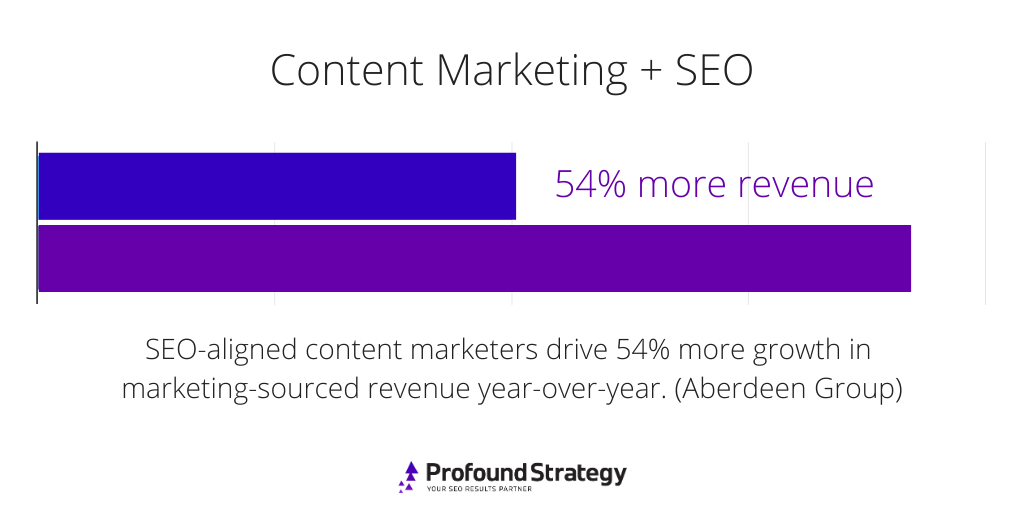Siloed SEO Doesn’t Work! How to Create an Integrated Strategy
Effective SEO does more than just help brands get better visibility in search. SEO tells you what words people use when searching for products and services your company provides. It shows exactly what types of content they’re looking for when searching for those words. It even tells where prospects are in the buying journey when they search for specific types of information.
That means that a modern SEO approach — using techniques like keyword research, intent optimization, and analytics tracking — benefits every other part of a digital marketing program.
Whether you’re starting or re-energizing your digital marketing strategy, take time to consider the many benefits that SEO integration provides.
How SEO Fits Into a Digital Marketing Strategy
Marketers that include SEO from the beginning of building a digital marketing strategy enjoy many benefits:
- Uncover the most promising marketing channels. Using tools like Ahrefs, SimilarWeb, and Google Analytics, SEOs can tell what marketing channels should be targeted. They do this by reviewing a company’s historical performance metrics, or by looking at what channels are and aren’t working for competitors.
- Develop detailed audience insights. By reverse-engineering organic search results using keyword and user intent research, SEOs can tell what types of people are most likely to be interested in a product/service, how prospects search for information before making a decision, and what types of content best engage your target audience.
- Identify the most important metrics to track. SEOs can help pinpoint exactly what metrics to track in order to measure progress towards the KPIs and goals of different digital marketing initiatives.
Integrating SEO during the strategy phase also gives the department an opportunity to weigh in on when they should be consulted by other marketing teams, and also to speak to how they can help other marketing programs become more effective.
SEO and Content Marketing
SEO and content marketing go hand-in-hand. Modern SEO cannot succeed without quality content. It’s one of Google’s top three ranking factors, and nearly 72% of marketers consider content creation the most effective SEO tactic.
On the other hand, content cannot perform its best without SEO. 81% of B2B purchase cycles and 89% of shoppers begin their buying journey with a web search, and SEO-aligned content marketers drive 54% more revenue growth year-over-year.

When paired, SEOs can use keyword + user intent research and analytics to help content marketers:
- Fill their editorial calendars with topics.
- Find out what types of content audiences prefer when reading about those topics.
- Build detailed buyer personas.
- Discover what topics/pages are most likely to convert.
- Prove content’s effect on sales and revenue.
Good content is the vehicle for good SEO, and SEO insights are the only way to drive winning content.
SEO and Email Marketing
In addition to some of the same benefits as SEO + content marketing—such as clarifying audiences—SEO insights help email marketing teams build a framework for the information needed at different points in the buying journey.
SEOs do this by mapping keywords to the buying journey with user intent research.
This allows email marketing teams to understand where prospects probably are in the journey based on what email content they interact with. It can also be used to develop an email sequencing strategy that ensures subscribers are receiving the right information at the right time—content designed to move them deeper into the purchasing funnel.
SEO and Social Media
Social media marketers can use SEO insights to learn more about their audience. This helps them post more targeted and personalized updates which boost engagement, clicks, likes, and follower counts.
Additionally, social media marketing helps SEO:
- Social media channels are outstanding content promotion outlets that help SEOs get content in front of influencers to earn more inbound links.
- Social media can also improve audience engagement with content—which is one of many signals used by RankBrain to determine content quality and relevancy.
Social media metrics can inform and improve SEO content efforts, and SEO insights can help create more targeted social media content.
SEO and PPC
SEO and PPC are traditionally pitted as opposites, but together, they offer twice the level of insight into which keywords, meta tags, and headlines effectively drive traffic—and which don’t. SEOs can use PPC insights to gather this information more quickly because ads are much simpler to get on page one of the SERPS.
SEO and PPC teams should also collaborate regularly so they don’t waste budget on overlapping efforts, as well as to target the broadest set of search terms possible.
For example, if a new piece of content has earned the top position in the search results for its targeted keyword, it may not be worthwhile to continue running PPC campaigns using the same keyword.
On the other hand, if SEO isn’t able build content that ranks for a crucial business keyword, the PPC team can jump in and target the keyword with search ads.
How to Successfully Integrate SEO into an Overall Marketing Strategy
Integrating SEO into an overall digital marketing strategy means prioritizing its visibility, authority, and reach in as many ways as possible.
- Involve SEO as early as possible. Too many marketing teams consider SEO too late in the planning process to take advantage of many of the insights it provides. SEO can help with the upfront work required to develop a marketing strategy, such as developing buyer personas, creating content calendars, and making site navigation decisions.
- Get all the buy-in. Effective SEO requires cross-departmental buy-in and support. SEO has suffered from some poor PR because of black-hat practitioners and outdated practices, so it will take some convincing to get people up to speed on the value of modern SEO. It’s crucial that everyone understands how SEO fits into the big picture.
- Start with a technical audit and clean-up. This might seem strictly SEO, but a clean bill of health for your website will make every digital marketing function more efficient and effective.
- Involve every department. Even strategies and tasks that are exclusively about SEO—or that don’t directly benefit other marketing channels—need input from a variety of departments within the organization. Product marketing, sales, and customer service all have crucial insights that will help build a truly effective SEO strategy.
The more you develop and hone an SEO strategy, the more opportunities you will discover for integrating SEO into every other area of digital marketing, and the more those other channels will—in turn—inform your SEO. Effective SEO simply cannot be done in a silo.
The Bottom Line? Effective SEO Integration Is Worth The Effort
SEO best practices are constantly evolving, but the value of SEO continues to increase. It remains the number one source of lead generation, and about 73 percent of in-house marketers rate it as providing good to excellent ROI. The reason you hear about the importance of SEO integration from all sides is that—quite simply—it works!
Learning SEO best practices can take time—and combining it seamlessly with existing marketing campaigns will take effort—but the vast majority of marketers who’ve taken steps to understand and use SEO do not regret it. It’s almost guaranteed to improve everything you’re already doing and open up additional opportunities for business success.
Bring SEO in early, break down its silo, and take advantage of the valuable insights it provides.
What's Next?
Profound Strategy is on a mission to help growth-minded marketers turn SEO back into a source of predictable, reliable, scalable business results.
Start winning in organic search and turn SEO into your most efficient marketing channel. Subscribe to updates and join the 6,000+ marketing executives and founders that are changing the way they do SEO:
And dig deeper with some of our best content, such as The CMO’s Guide to Modern SEO, Technical SEO: A Decision Maker’s Guide, and A Modern Framework for SEO Work that Matters.




